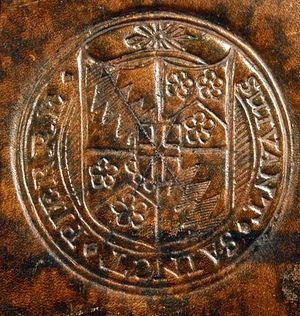Difference between revisions of "John Knight 1622-1680"
m (David moved page John Knight to John Knight 1622-1680 without leaving a redirect) |
|||
| (21 intermediate revisions by 3 users not shown) | |||
| Line 1: | Line 1: | ||
| − | ===[[ | + | __NOTITLE__ |
| − | + | ===[[name::John]] [[name::KNIGHT]] [[date of birth::1622]]-[[date of death::1680]]=== | |
| + | [[File:KnightJohn1.jpg| thumb | Armorial stamp of John Knight (British Armorial Bindings)]] | ||
====Biographical Note==== | ====Biographical Note==== | ||
| − | Born in [[ | + | Born in [[place of birth::London]], son of [[family::Thomas Knight]], [[occupation::herald painter]]. [[apprentice::Apprenticed]] to [[associates::Edward Molins]], a [[location::London]] [[occupation::surgeon]]. He travelled with royalist armies in the mid 1640s and after living for a while in [[location::King's Lynn]] he rejoined the royalist forces and went into exile with the English court in [[location::Paris]] during the Interregnum, where he became their [[occupation::surgeon]]. He returned with them in 1660 and was made [[occupation::serjeant-surgeon]] to [[associates::Charles II]] in 1661, and in 1664 [[occupation::surgeon-general]] to all forces in [[location::England]] and [[location::Wales]]. He was [[occupation::Master]] of the [[organisations::Barber-Surgeons Company]] in 1663-4 and 1677-8. |
====Books==== | ====Books==== | ||
| − | Knight "shared a love of books" with [[ | + | Knight "shared a love of books" with [[crossreference::Samuel Pepys]], who he knew through navy work (''ODNB''), and to whom he [[bequest::gave]] a [[format::manuscript]] copy of his [[book title::"Discourse containing the history of the cross of St George"]]. His [[family::grandfather]] and [[family::great-grandfather]] had been [[occupation::heralds]] and a collection of [[bequest::66 heraldic manuscripts]], which came to Knight on the death of his elder brother [[family::William Knight|William]] in 1662, was bequeathed by him to [[beneficiary::Gonville and Caius College, Cambridge]]. His will contained a number of other directions for books: [[education::Gonville and Caius College, Cambridge|Caius]] was also [[bequest::left]] his [[format::prints]], and a copy of [[author::Dugdale]]'s [[book title::''Baronage of England'']], with the arms hand-coloured by himself, [[beneficiary::Samuel Pepys|Pepys]] was left several [[bequest::books]], and ca.[[bequest::20 books]], specified in a schedule to the will, were left to [[beneficiary::Ipswich Town Library]], the home town of his [[family::wife]]. These were largely 17th century [[subject::history|historical]] texts, including several English county histories, and a two-volume [[subject::cartography|atlas]] of ca.200 hand-coloured French maps. All his books "of [[subject::medicine|physick]] and [[subject::surgery|chirurgery]]", together with his medical instruments, were left to be divided between his [[beneficiary::assistant]] and his [[beneficiary::apprentice]]. The [[bequest::residue of his estate]] was left to two of his [[beneficiary::nephews]]; this presumably included other books, as the armorials database records a number of books with Knight's arms now found in various libraries. |
| − | |||
| − | |||
====Sources==== | ====Sources==== | ||
| − | + | <div id="sourcelist"> | |
| + | *[https://armorial.library.utoronto.ca/stamps/IKNI001_s1 British Armorial Bindings]. | ||
| + | *Blatchly, J. ''The Town Library of Ipswich'', 1989, 40-44, 195-9. | ||
| + | *Knighton, C. S. [https://doi.org/10.1093/ref:odnb/74863 "Knight, John (bap. 1622, d. 1680), surgeon."] ''Oxford Dictionary of National Biography''. | ||
| + | </div> | ||
| + | {{DEFAULTSORT:Knight, John}} | ||
[[Category:Surgeons]] | [[Category:Surgeons]] | ||
| − | [[Category: | + | [[Category:Armorial Stamps]] |
| − | [[Category: | + | [[Category:Libraries Bequeathed to Institutions]] |
| − | [[Category:Libraries | + | [[Category:Libraries Bequeathed to Towns, Parishes, etc]] |
| − | [[Category: | + | [[Category:All Owners]] |
Latest revision as of 02:16, 9 January 2022
John KNIGHT 1622-1680
Biographical Note
Born in London, son of Thomas Knight, herald painter. Apprenticed to Edward Molins, a London surgeon. He travelled with royalist armies in the mid 1640s and after living for a while in King's Lynn he rejoined the royalist forces and went into exile with the English court in Paris during the Interregnum, where he became their surgeon. He returned with them in 1660 and was made serjeant-surgeon to Charles II in 1661, and in 1664 surgeon-general to all forces in England and Wales. He was Master of the Barber-Surgeons Company in 1663-4 and 1677-8.
Books
Knight "shared a love of books" with Samuel Pepys, who he knew through navy work (ODNB), and to whom he gave a manuscript copy of his "Discourse containing the history of the cross of St George". His grandfather and great-grandfather had been heralds and a collection of 66 heraldic manuscripts, which came to Knight on the death of his elder brother William in 1662, was bequeathed by him to Gonville and Caius College, Cambridge. His will contained a number of other directions for books: Caius was also left his prints, and a copy of Dugdale's Baronage of England, with the arms hand-coloured by himself, Pepys was left several books, and ca.20 books, specified in a schedule to the will, were left to Ipswich Town Library, the home town of his wife. These were largely 17th century historical texts, including several English county histories, and a two-volume atlas of ca.200 hand-coloured French maps. All his books "of physick and chirurgery", together with his medical instruments, were left to be divided between his assistant and his apprentice. The residue of his estate was left to two of his nephews; this presumably included other books, as the armorials database records a number of books with Knight's arms now found in various libraries.
Sources
- British Armorial Bindings.
- Blatchly, J. The Town Library of Ipswich, 1989, 40-44, 195-9.
- Knighton, C. S. "Knight, John (bap. 1622, d. 1680), surgeon." Oxford Dictionary of National Biography.
